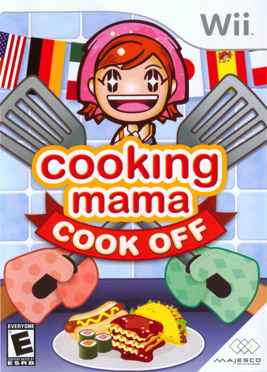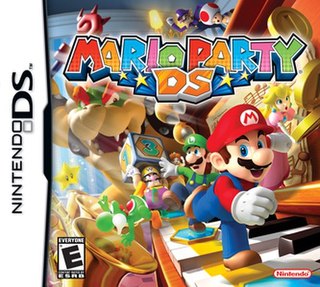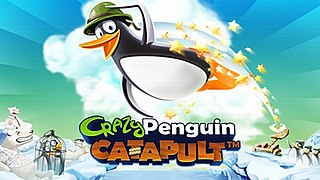
Dr. Mario is a 1990 puzzle video game developed and published by Nintendo for the Nintendo Entertainment System and Game Boy. It was produced by Gunpei Yokoi and designed by Takahiro Harada. The soundtrack was composed by Hirokazu Tanaka.

Cookie is a cooking-themed shoot 'em up developed and published by Ultimate Play the Game that was released exclusively for the ZX Spectrum in 1983. In the game, Charlie the Chef has to bake a cake, however his five ingredients are sentient and attempt to escape his pantry, enabling his quest to re-capture them. The game was written by Chris Stamper with graphics by Tim Stamper. It received mixed reviews upon release, with critics praising the graphics, but criticising the hard difficulty and its similarities to Pssst.

White chocolate is a confectionery typically made of sugar, milk, and cocoa butter, but no cocoa solids. It is pale ivory in color, and lacks many of the compounds found in milk, dark, and other chocolates. It is solid at room temperature because the melting point of cocoa butter, the only white cocoa bean component, is 35 °C (95 °F).

Death by Chocolate is a colloquial descriptive or marketing term for various cakes and desserts that feature chocolate, especially dark chocolate or cocoa, as the primary ingredient. The phrase is trademarked in some countries, and the dessert is a signature dish of Bennigan's restaurants in the United States.

Cooking Mama is a cookery simulation-styled minigame compilation video game for the Nintendo DS, and it was later ported to iOS as Cooking Mama: Lets Cook! in 2015. It was developed by Office Create and published by Taito, Majesco Entertainment, and 505 Games. It was awarded IGN's "Best Of E3" award for 2006. It is the start of the Cooking Mama series, with 4 more main series titles on DS and Nintendo 3DS, two spin offs on Wii, and a spin off on 3DS. It also spins off into the Gardening Mama series. For later titles in the series, the publishers and Office Create joined together to form Cooking Mama Limited, which was made exclusively to develop the Cooking Mama series.

Cooking Mama: Cook Off is a video game for the Wii developed by Office Create and published by Taito in Japan, Majesco Entertainment in North America, and 505 Games in Europe and Australia. It is a spin off of the Nintendo DS game Cooking Mama. The game was released in Japan on February 8, 2007 and in North America on March 20, 2007. In Europe, it was released on May 11, 2007, with an Australian release closely following on May 18, 2007. The Wii sequel to this game, Cooking Mama: World Kitchen was released in the US in November 2008.

Cooking Mama 2: Dinner with Friends is the sequel to the Nintendo DS video game Cooking Mama and its Wii spin off, Cooking Mama: Cook Off. The game has twice as many minigames as the original, new recipes, and a new multiplayer "Cook Off" mode. The game includes voice clips similar to the ones used in Cooking Mama: Cook Off.

Mario Party DS is a 2007 party video game developed by Hudson Soft and published by Nintendo for the Nintendo DS. It is the second handheld game in the Mario Party series, as well as the last game in the series to be developed by Hudson Soft, as all subsequent titles have been developed by NDcube. The game was re-released on the Virtual Console for the Wii U in April 2016.
PlayFirst, Inc. is a Delaware based American publisher of casual games founded in 2004 by industry veterans. PlayFirst produced the Diner Dash series, which won the 2008 Annual Casual Game Awards. and has seen over 550 million downloads. The popularity of Diner Dash series prompted spin-off series like Wedding Dash and Cooking Dash. The company’s game portfolio also includes the retro-style strategy-based Chocolatier series, and the adventure/hidden object-mixing Dream Chronicles series.

Chocolatier is a casual strategy video game with action game elements, developed by American studio Big Splash Games and published by PlayFirst. The game was released for download on May 1, 2007, and was followed by a CD-ROM release on September 27. Players assume the role of a young chocolatier, who must navigate 14 cities around the globe while buying ingredients, manufacturing chocolate confections, and selling them to chocolate shops. Two modes of play are available: in story mode the player must rebuild an almost-bankrupt chocolate empire and acquire 64 chocolate recipes from around the world; in free mode players start out with scant resources and must become successful chocolatiers.

Pac-Man Party is a party game by Namco Bandai Games for the Wii, Windows Mobile, and Nintendo 3DS. It is similar to the Mario Party series and Monopoly games for the Wii. In the game's story mode, players must retrieve a stolen cookie recipe from Pac-Man's enemies Blinky, Pinky, Inky, and Clyde and return it to its rightful owner, Mr. Cookie. The game was released to coincide with Pac-Man's 30th anniversary. The game notably features redesigns of the main characters which would carry over to following Pac-Man titles in the mid-2010s, culminating with Ghostly Adventures.

Chocolatier: Decadence by Design is a casual strategy video game, developed by Big Splash Games LLC and published by PlayFirst. The game was released on January 22, 2009 for the Mac OS X and Windows. In 2011 it was released on the iOS platform. In the game, the players are able to create their own chocolate by combining ingredients and designing their own chocolate. It is the third video game in the Chocolatier series.

Epic Astro Story is a simulation video game developed and published by Kairosoft for the Android and iOS operating systems. It was released in December, 2011 for Android and in April, 2012 for iOS. The player is tasked with managing and expanding a colony in a science fiction setting, while also exploring both their colony and other planets. The game has received mostly positive reviews from critics.

Crazy Penguin Catapult is an action-adventure mobile game developed by Sumea and published by Digital Chocolate for Java ME mobile devices in 2007, and later ported to Microsoft Windows and iOS. The game revolves around courageous penguins fending off their territories from invading polar bears using a catapult. It is reminiscent of Yetisports.

Five Nights at Freddy's 2 is a 2014 point-and-click survival horror game developed and published by Scott Cawthon. It is the second installment in the Five Nights at Freddy's series. Set in a fictional pizzeria, the player takes on the role of night security guards Jeremy Fitzgerald and Fritz Smith, defending themselves from the restaurant's hostile animatronic mascots. The player cannot leave their office, but has access to a flashlight and security cameras throughout the restaurant to monitor animatronic activity. Wearing a mask that looks like one of the animatronics allows the player to avoid being detected in most cases, though some animatronics are repelled via other methods. If the player is detected, they will be jumpscared and experience a game over. As the game progresses, Atari-styled minigames and phone calls provide insight into the history of the restaurant.

Five Nights at Freddy's 4 is a 2015 point-and-click survival horror video game made and published by Scott Cawthon. It is the fourth installment of the Five Nights at Freddy's series. The game takes place in the bedroom of a child, where the player must avoid attack by nightmarish animatronics that stalk them. Unlike previous games in the series, the player does not have access to a network of security cameras to monitor animatronic progression, and instead must rely on audio cues. In-between nights, the player is able to play Atari-styled minigames that tell the story of a young boy that is consistently tormented by his older brother.

Five Nights at Freddy's (FNaF) is a video game series and media franchise created by indie game developer Scott Cawthon. The franchise features ten main video games, several spin-off games, novels, and a film adaptation.

Eric Barone, known professionally as ConcernedApe, is an American game designer and musician. He is best known for independently creating the video game Stardew Valley.

Cake Bash is a party video game developed by High Tea Frog and published by Coatsink. The game was released for Microsoft Windows, PlayStation 4, Xbox One, and Google Stadia on October 15, 2020, later releasing on November 19 for the Nintendo Switch. In the game, players control cakes competing against each other in order to be chosen by a customer.

Rusty Lake Hotel is a 2015 puzzle video game by Rusty Lake. Players attempt to solve various puzzles in a surreal hotel.



















